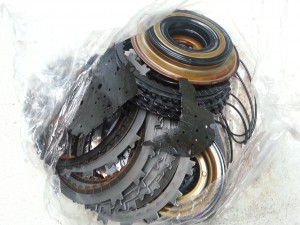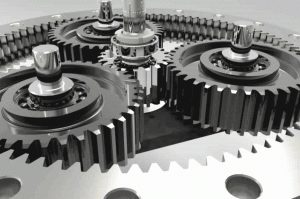It finally happened.
I’ve been nursing along my car’s transmission for several months (careful driving, changing the fluids, etc.), but last week it finally failed completely, with an accompanying whump! and a jerk, and the car had to be towed to the auto repair shop.
The initial hope was that a regular tear-down and cleanout, along with replacement of the wearable parts, would take care of it. That was going to set me back about $1,500, which I wasn’t happy about but could live with. Unfortunately, it turned out that some of what the transmission guys call “hard parts” – in this case the planetary gear assembly – were broken, so they were going to have to order a whole new planetary assembly and do additional work. Ouch! Suddenly the repair quote more than doubled.
I immediately jumped into serious backup mode, doing research on both new and used car options – local dealers, local adds, Craigslist, eBay, you name it. Maybe I should just turn in my keys and get a new set of wheels? However, other than the transmission my car is still in excellent shape, and my personal experience as well as that of others I talked to suggested I should still get another 100,000 miles from the vehicle. The exterior and interior are likewise still in good shape. Yes, with a used car there is always a risk that something else major will go wrong, but where else was I going to be able to find a used car in great condition for less than $4K? From that perspective and after much handwringing I finally broke out the plastic and with much trepidation went with the full transmission rebuild.
As I write this, I have just returned from the shop about an hour ago with a smoothly-purring ride. Not only is the car able to drive again, but it is noticeably smoother than it has been the past several months. While driving home I reflected on the whole experience, what I’ll call the “Tale of the Transmission.”
Some of the old parts from the transmission are pictured here:

Unfortunately, the planetary assembly went to the scrap recyclers so I don’t have a picture of it. They vary from design to design, but in case you haven’t seen such a thing, this is a very basic version of what I’m talking about (courtesy Google Images):

Modern automatic transmissions are built to very precise tolerances. It doesn’t take much of deviation for things to get out of whack. What would it take to create a transmission in the first place or to improve upon its design?
The Darwinian doctrine teaches that complex functional integrated systems are built up over time by what are essentially random tweaks to the parts. Actually, not even to the parts themselves, but to an underlying digital code that is part of inventory catalog interacting with an operating system. That, we are told, tweaks the parts, which tweaks the ultimate function.
Let us keep in mind that in much of biology we are not talking about slight differences in the color of moths’ wings or minor deviations in the length of finches’ beaks. We are talking about fundamental functional systems that go beyond the mere incremental benefit of being slightly more “fit” in a particular environment and instead to the sheer ability of the organism to function at all or to exist in the first place. True, there are many things about an organism that can support minor adjustments and tweaks without significant harm to the organism, just as with my car: a scratch in the paint, a bent antenna, a cracked windshield, even a missing muffler – all of those still allow the car to perform its essential function. However, there are other systems in an organism, like the transmission in my car, that are critical to the organism’s very existence. We cannot simply tweak such systems indiscriminately and expect to avoid a catastrophic failure.
Each one of us has experienced dozens of similar situations and technology has become so ubiquitous in our life that we tend to take it for granted. This numbness to the marvel of functional specified complexity, this everyday over-familiarity, this tendency to take such systems for granted is perhaps part of what allows the seductive Darwinian paradigm to take hold. But if we pause for a moment and think about what is involved in producing a complex functional machine in three-dimensional space the entire idea that such a state of affairs could arise as the result of a long series of purposeless mutations seems utterly bizarre.
Yet, contrary to what we see in the world around us, contrary to our own experience, contrary to everything we know and understand about how such systems arise, this is precisely what the Darwinian doctrine asserts. It is as though the magician on stage – obscuring the background with smoke and mirrors and wielding the magic wand of natural selection – is challenging us, taunting us, with the age-old refrain: “Who are you going to believe? Me, or your lying eyes?” The Darwinian story is, at once, a simplistic, naïve childlike tale and at the same time an unparalleled assertion of unmitigated intellectual gall.
Our experience with a mission-critical functional system like a car’s transmission is of course not an isolated incident. As the examples multiply by orders of magnitude, the disconnect between what we know to be the case in the real world and what we are told is the case in the hypothetical Darwinian world stretches to the intellectual point of breaking. I use the word deliberately. Let us be intellectually honest – supporter and skeptic alike – the Darwinian evolutionary world is precisely that: a hypothetical. Never in more than a century and a half of dedicated toil and searching has a single example been found of a complex functional system arising via a purely natural series of Darwin’s “slight, successive changes.” Much less the whole of the biosphere. Might such a complex functional system, built up slowly by slight successive changes, be possible in theory? Perhaps. But residing as it does in the obscure recesses of deep time, the existence of such a system always has been, and remains to this day, a hypothetical.
Thus, having as it does no real-world examples and no hard evidence that such systems could actually come about through such a process, the Darwinian creation story relies instead on the listener’s credulity, vague references to unspecified forces, and appeals to deep time to lull the unsuspecting into believing that virtually anything is possible, no matter how contrary to real-world experience, no matter how speculative, no matter how outlandish.
As the mathematically-inclined would point out, this does not yet constitute a formal proof. But the intellectual unease that should accompany this gaping disconnect between the real world we live in and the hypothetical Darwinian world is itself very real. The faithful Darwinian might, as many do, repose hope in some future discovery, some as-yet-unidentified principle of nature to bridge the gap. But those who flatly deny the disconnect or repress the accompanying intellectual unease in a Herculean display of cognitive dissonance find themselves departing ever further from the real world and residing ever more in the hypothetical one.